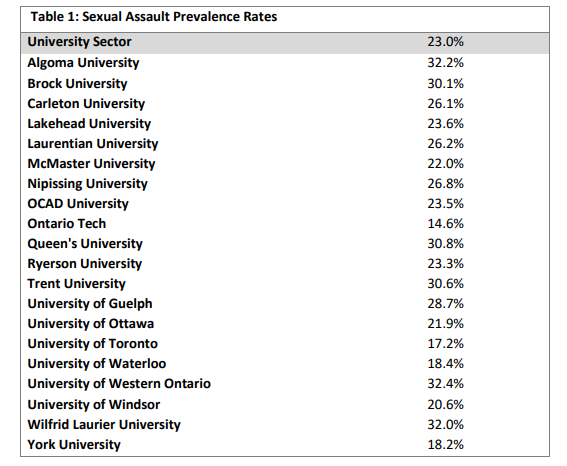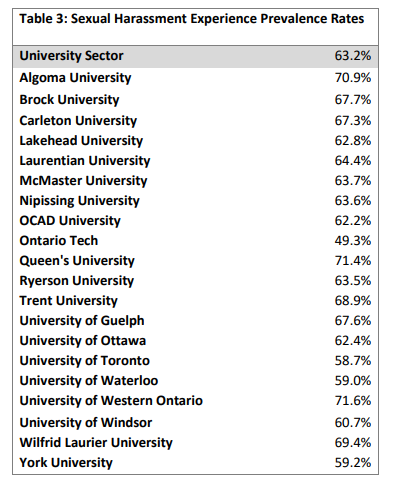A two-year study into sexual violence on Ontario university campuses has come to an end, unveiling shocking results.

The Ministry of Colleges and Universities surveyed over 117,000 students, which included 7,000 from Queen’s University, between Feb. 16 and April 2, 2018.
The survey found 23 per cent of university students experienced sexual assault since the start of the 2017-2018 academic year both on- and off-campus. Below is the prevalence rate of reported sexual assaults for the university sector and individual universities:

Queen’s University is fourth on the list for the prevalence of sexual assault.
Nearly 60 per cent of those surveyed said the methods of coercion associated with non-consensual sexual experiences caught them off guard, or the individual ignored body language or non-verbal signals.
Ontario students were also asked multiple questions about different forms of sexual harassment experienced since the start of the 2017-18 academic year. The survey found that 63.2 per cent of university students said they experienced sexual harassment one or more times.

Reports of sexual harassment among Queen’s students were recorded at 71.4 per cent — second on the list and behind the University of Western Ontario by a mere 0.2 per cent.
The students surveyed were asked about the characteristics of the perpetrator. Most (64.7 per cent) said they were sexually harassed by other students while nearly 38 per cent said it came from people with no university affiliation, with the least common perpetrator (6.3 per cent) being a faculty member, professor, instructor, or other.
The survey also asked students about stalking experiences during this time:

- What is a halal mortgage? How interest-free home financing works in Canada
- Capital gains changes are ‘really fair,’ Freeland says, as doctors cry foul
- Ontario doctors offer solutions to help address shortage of family physicians
- Budget 2024 failed to spark ‘political reboot’ for Liberals, polling suggests
The survey does say that the institutional tables only provide the overall average and percentages for each institution and that it is not possible to determine if the differences across institutions are due to university demographic profiles, demographic profiles of survey respondents at each university, or a real difference in terms of overall rates of sexual violence and other variables reported.
Ann Tierney, Queen’s University Vice Provost and Dean of Student Affairs, says that this disclaimer is important to keep in mind, but the data is a striking example of the issues students face and that more needs to be done to address sexual violence on campus.
“This survey gives us a better understanding of what our students need and what services they are aware of on campus,” Tierney said.
“We have at Queen’s a sexual violence prevention and response coordinator who offers non-emergency support for students. We also have counselling resources including counsellors who have experience in helping survivors of sexual violence.”

One Queen’s student, meanwhile, has taken it upon herself to aid in the effort.
Damiana Pavone, a fourth-year student, has spent the past two years developing the Queen’s Kingston Sexual Assault Clinic, an on-campus student-run initiative that cares for students who are affected by sexual violence.
“Over the past four years I’ve seen the student climate change with the whole #MeToo movement,” Pavone said, “which has picked up during my university experience and people affected want change.”
She continued, saying that misogynistic language and inappropriate touching can be frequently experienced on campus and that it’s important for students who feel unsafe to have a place to go, whether it’s initiated by the university or by student groups like QKSAC.
“I think students are fed up in general, and we are realizing that we’re at a university, and it’s time we step up,” Pavone said.
“The school needs to focus on education in the classroom and out of it. Sexual violence education needs to be a priority.”
When Pavone was asked about her experience at Queen’s she quickly said with a smile on her face, “I love Queen’s. Maybe im biased, but it’s the best school.
“Of course, every school is going have its issues, and Queen’s isn’t perfect like every university, but we’re trying.”




Comments